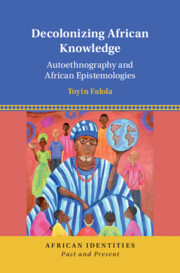Book contents
- Decolonizing African Knowledge
- African Identities: Past and Present
- Decolonizing African Knowledge
- Copyright page
- Dedication
- Contents
- Figures
- Notes on Language and Orthography
- Preface
- Acknowledgments
- Part I Introduction
- Part II History, Fictions, and Factions
- 3 Narrative Politics and Cultural Ideologies
- 4 Memory, Magic, Myth, and Metaphor
- 5 A Poetological Narration of the Nation
- 6 A Poetological Narrative of the Self
- 7 Satire and Society
- 8 Narrative Politics and the Politics of Narrative
- Part III Visual Cultures
- Part IV Conclusion
- Bibliography
- Index
8 - Narrative Politics and the Politics of Narrative
from Part II - History, Fictions, and Factions
Published online by Cambridge University Press: 23 June 2022
- Decolonizing African Knowledge
- African Identities: Past and Present
- Decolonizing African Knowledge
- Copyright page
- Dedication
- Contents
- Figures
- Notes on Language and Orthography
- Preface
- Acknowledgments
- Part I Introduction
- Part II History, Fictions, and Factions
- 3 Narrative Politics and Cultural Ideologies
- 4 Memory, Magic, Myth, and Metaphor
- 5 A Poetological Narration of the Nation
- 6 A Poetological Narrative of the Self
- 7 Satire and Society
- 8 Narrative Politics and the Politics of Narrative
- Part III Visual Cultures
- Part IV Conclusion
- Bibliography
- Index
Summary
This chapter attempts to “study some of the many intersections between narratives and politics.” The human life or experience is seen as a story, a compilation of narratives that explain our realities. Similarly, politics, the apogee of any society, designed to establish and maintain it, is a “human narrative,” independent, and can be comprehended in relation to other aspects of the society. To expound on the theme of “collective action,” the chapter answers three questions: how people come together for a common goal; why enforcers of collective actions turn to stories; and the significance of storytelling in triggering a collective action. The chapter finds answers in “affinity” (feeling of oneness, proximity, and brotherhood) and “solidarity” (feeling of a common goal). The chapter broaches the issue of the inhibition to narrative politics — the “perceived reliance on imperial system of knowledge,” as well as its emancipation — “the elevation of repressed narratives.” In addition, through the author’s personal experiences, encounters, and references to scholarship, he mirrors some African narratives, especially the Yoruba and their importance in spurring positive change.
- Type
- Chapter
- Information
- Decolonizing African KnowledgeAutoethnography and African Epistemologies, pp. 183 - 202Publisher: Cambridge University PressPrint publication year: 2022

